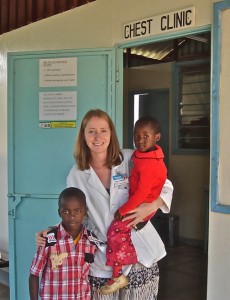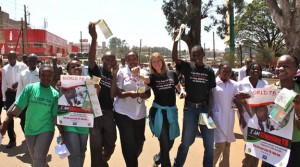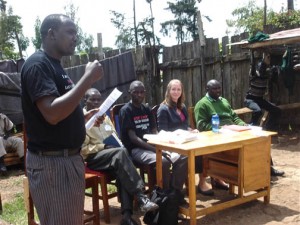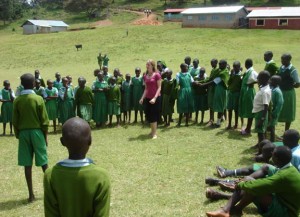By Barbara Mulligan
When medical student Daria Szkwarko ’06 arrived in Kenya for a clinical research experience last August, she hoped to figure out what area of medicine she wanted to pursue, become proficient in Swahili, collaborate with professionals, and establish a “side project.” But first of all, she wanted “to learn what it takes to conduct clinical research in a low-resource setting.”

Daria Szkwarko '06 with two children who were identified and screened through the child contact register program in Eldoret, Kenya.
By the end of June, Szkwarko had realized most of her goals and learned a number of professional and personal lessons that are with her now as she begins her fourth year at the University of Medicine and Dentistry of New Jersey’s School of Osteopathic Medicine, Stratford, N.J.
As a Fogarty International Clinical Research Fellow, Szkwarko worked with E. Jane Carter, M.D., at Moi University School of Medicine in Eldoret, Kenya. She worked to implement a child contact registry to identify children exposed to tuberculosis in their households.
For Szkwarko, the day-to-day reality of watching those children struggle “was definitely difficult.” Although she didn’t normally interact directly with the children, she encountered some heartbreaking situations.
“We had a mother who brought three children in who had been exposed to TB,” says Szkwarko. “She didn’t have any money, and she had walked an hour and a half to the clinic with her children.”
Szkwarko explains that patients had to pay for chest x-rays and treatment unless the patient was HIV-positive. When the family was unable to pay for the chest x-rays, Szkwarko decided to help out.

Daria Szkwarko '06 (center) marches with co-workers in a parade through Eldoret on World TB Day.
“We ordered two chest x-rays to rule out tuberculosis,” Szkwarko says. “An x-ray costs the equivalent of $5. It’s a Starbucks coffee.”
When she arrived in Kenya, Szkwarko says she told Carter, an associate professor of medicine at Brown University who had worked in Kenya for 15 years, that she was interested in “linking evidence-based medicine guidelines and health care delivery on the ground.”
“She said, ‘we have a term for that,’ ” Szkwarko recalls. “ ‘It’s called operations research. It’s more implementation rather than basic clinical research.’ ” For Szkwarko, that was a moment that helped her develop plans for her medical future.

Daria Szkwarko '06 and others in the cough monitor program visit a prison in Tambach to teach about TB.
At Lafayette, as a neuroscience major and French minor, she did in-depth work on medieval and Renaissance French literature through the EXCEL Scholar collaborative student-faculty research program. As an athlete, she won the James F. Bryant ’40 Excellence Award for pole vault during her junior year, and continues to share the Lafayette indoor pole vault record, at 11’4”. In addition, she volunteered at an Easton nursing home, where she worked with dementia patients.
Before she entered medical school, Szkwarko also spent part of a summer volunteering in the psychiatric ward of a hospital in France, watched her pediatrician aunt examine patients in Ukraine, spent six weeks working on a malaria-research project in Tanzania, and traveled to India.
The visit to India, Szkwarko says, “really opened my eyes to the economic disparities around the world. People are dying of completely preventable and curable diseases.”
That experience, combined with her experiences in Tanzania, Ukraine, and France, deepened Szkwarko’s strong interest in learning about health-care systems throughout the world. The experience in Kenya reinforced that interest.
“I loved being there because a lot of the work will make a difference,” she says. “That kept me going.”
Inspired to continue her work, Szkwarko applied for a grant through the American Medical Association Foundation to implement and evaluate a system to screen and track HIV-positive children who have been exposed to TB in their households. She will return to Kenya in April to finish this work.
In the future, after medical school and residency, Szkwarko hopes to practice family medicine in Africa and encourage the development of additional family medicine training programs for native physicians.

Daria Szkwarko '06 teaches children about TB at a school in Tambach.
“Education could make a world of difference,” she says, explaining that, for instance, rheumatic heart disease is caused by a strep infection, which can be diagnosed and treated quickly and efficiently in many other areas of the world. “I’ve seen a 12-year-old die from it. I wondered why we aren’t doing anything in the villages to treat a strep throat infection.”
While in Kenya, Szkwarko planted a Kenyan vegetable garden, blogged about her experiences, and, as her stay was coming to an end, poked fun at her earlier aspirations.
“Wow. Could I have been any more broad [referring to learning how to conduct clinical research in a low-resource setting]?” she wrote in late June. “That’s equivalent to, ‘Learn how to cook international cuisine.’ … I think it’s amazing that I never realized what constitutes clinical research in the global health arena and how many different ways you can do ‘research.’”
Szkwarko says she felt confident writing the grant proposal, which helped fund her work in Kenya, thanks to several Lafayette professors, most notably Provost Wendy Hill, who focused on grant-writing skills in an animal behavior class she taught while serving as Rappolt Professor in Neuroscience.



